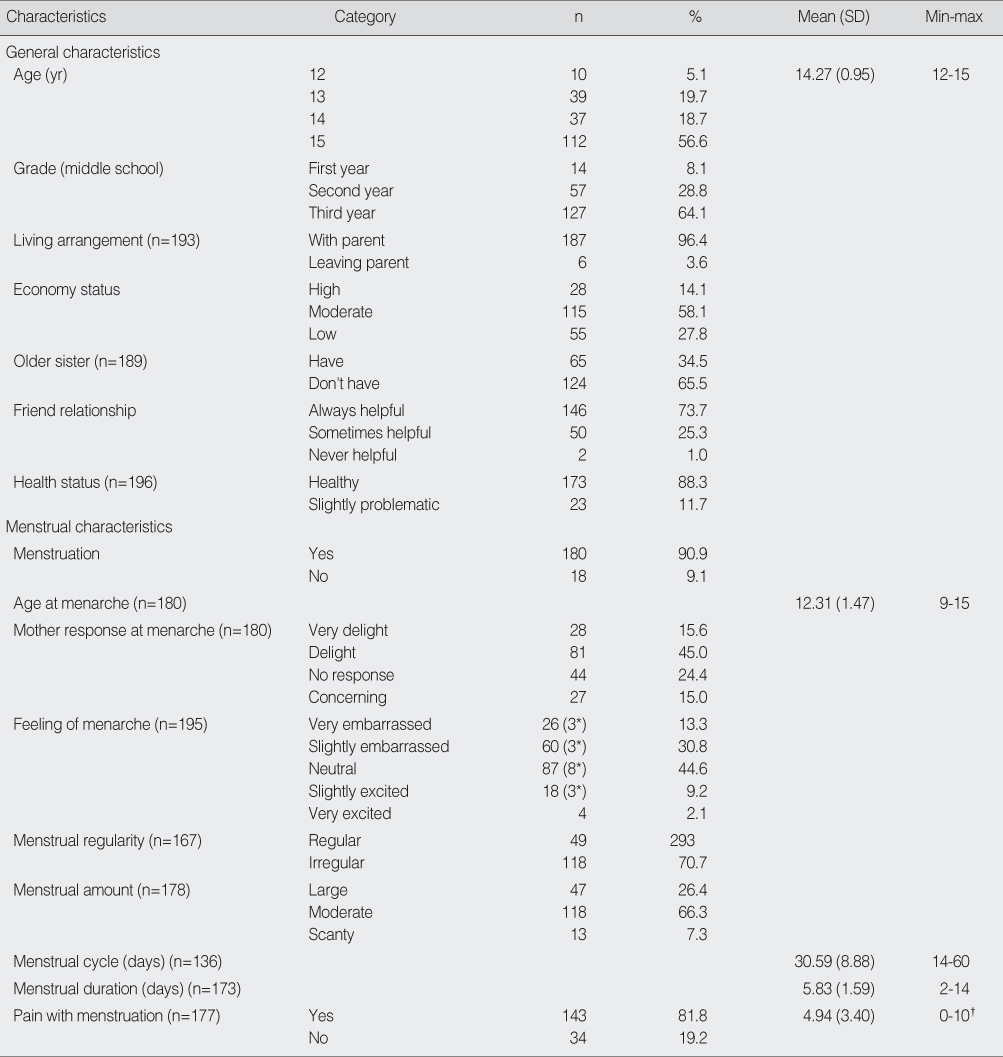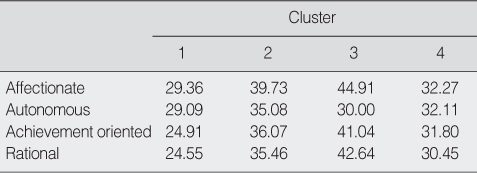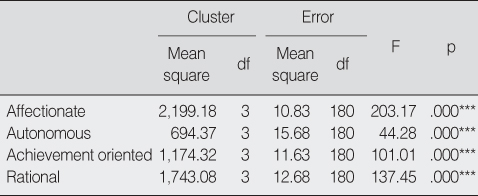Articles
- Page Path
- HOME > J Korean Acad Nurs > Volume 38(5); 2008 > Article
-
Original Article
- Menstrual Attitudes and Maternal Child Rearing Attitudes in Middle School Female Students
- Kyoung Ja Hong, Hae Won Kim, Hye Young Ahn
-
Journal of Korean Academy of Nursing 2008;38(5):748-757.
DOI: https://doi.org/10.4040/jkan.2008.38.5.748
Published online: October 30, 2008
1Professor, College of Nursing, Seoul National University, Seoul, Korea.
2Professor, Department of Nursing, Kwandong University, Gangneung, Korea.
3Associate Professor, College of Nursing, Eulji University, Daejeon, Korea.
- Address reprint requests to: Kim, Hae Won. Department of Nursing, Kwandong University, 522 Naegok-dong, Gangneung 210-701, Korea. Tel: 82-33-649-7613, Fax: 82-33-649-7620, hwkim@kd.ac.kr
Copyright © 2008 Korean Society of Nursing Science
Abstract
-
Purpose
- This correlational study was performed to identify the impacts of maternal child rearing attitudes on the menstrual attitudes and the determinants of positive menstrual attitudes in female middle school students.
-
Methods
- With convenience sampling, 198 middle school female students were recruited living in one major city and its surrounding areas in Korea. Data was collected using a self administered questionnaire including menstrual attitudes and maternal child rearing attitudes from April 1 to July 15, 2008.
-
Results
- Among the Maternal child rearing attitudes, affectionate, achievement oriented and rational attitudes had positive correlations to a positive menstrual attitude, and an autonomous attitude had a negative correlation to a negative menstrual attitude. As determinants of positive menstrual attitudes, feeling of menarche, mother's response at first menstruation, and rational maternal child rearing attitudes were delineated and their explained variance for a positive menstrual attitude was 18.5%. There was no difference on menstrual attitudes by K clustering in terms of maternal child rearing attitudes.
-
Conclusion
- These results support the critical role of the mother. Especially desirable maternal child rearing attitudes in relation to a positive menstrual attitude would be affectionate, achievement oriented and rational for early adolescent girls. In further studies, considerations are needed for menstruation related education and research for early adolescents and active involvement of the mother & daughter together.
- 1. Ahn HJ. Study on the relationship between parenting attitudes and emotional Intelligence. 1999;Seoul, Seoul National University. Unpublished master's thesis.
- 2. Chung HS. Menstrual experience of adolescent girls. 1995;Seoul, Chung-ang University. Unpublished doctoral dissertation.
- 3. Clarke AE, Rubble DN. Young adolescent's beliefs considering menstruation. Child Development. 1978;49:231–234.ArticlePubMed
- 4. Golub S. Menarche: The beginning of menstrual life. Women & Health. 1983;8:17–36.Article
- 5. Gwak MY. Attitude toward menstruation, sex role identity of elementary school girl student. 2001;Daejeon, Chungnam University. Unpublished master's thesis.
- 6. Hong KJ, Park YS, Kim JE, Kim HW. Transcultural differences on perimenstrual discomforts, menstrual attitudes and sex role acceptance between Korean and American college students. Journal of Korean Academy of Nursing. 1998a;28:233–243.ArticlePDF
- 7. Hong KJ, Park YS, Kim JE, Kim HW. Study on the effects of the nursing intervention program for perimenstrual discomfort of the female university students. Journal of Korean Academy of Nursing. 1998b;28:821–831.ArticlePDF
- 8. Hong SO, Moon MS. The effects of social economic status upon rear attitude and children's temperament. The Journal of Child Education. 2007;16:57–70.
- 9. Kim HJ. Study on an attitude toward menstruation, perimenstrual symptoms, and coping of nursing students. Korean Journal of Women Health Nursing. 2005;11:288–295.ArticlePDF
- 10. Kim HW, Kown MK. A study of menstruation of middle school students. Korean Journal of Women Health Nursing. 2005;11:148–155.ArticlePDF
- 11. Kim HW. Relationships between sex role identity, health promoting behaviors, and premenstrual symptoms among female university students. Journal of Korean Academy of Nursing. 2007;3:1003–1012.
- 12. Kim JE. Psychology of Korean family. 1987;Seoul, Ehwa Women University Press.
- 13. Kim JE. College women students' attitude toward menstruation, perception of sex roles and pre and postmenstrual discomfort. Korean Journal of Maternal Child Health Nursing. 1992;2:55–69.
- 14. Kim JE. Analysis of menarche experience and raising of the need of menarche education. Korean Journal of Women Health Nursing. 1995;1:191–208.ArticlePDF
- 15. Kim JO, Goo HS. The development and the effect of parent education program on maternal child-rearing attitude. Korean Journal of Home Management Association. 2007;25:113–125.
- 16. Kwon MK, Kim HW, Ahn HY, Lee JW. Children's perception of mother's child rearing attitudes and problem conduct of children. Journal of Korean Academy of Child Health Nursing. 2005;11:132–141.
- 17. Lee S. Effects of child rearing attitudes on Korean elementary school children's sex role traits. Journal of the Korean Home Economics Association. 1986;24:199–207.
- 18. Lee CH. Relation between the experiences of menarche and menstrual attitudes of elementary 5th and 6th grade. 2007;Seoul, Yonsei University. Unpublished master's thesis.
- 19. McPherson ME, Korfine L. Menstruation across time: Menarche, menstrual attitudes, experiences, and behaviors. Women's Health Issues. 2004;14:193–200.Article
- 20. Min YK. Menstrual attitude structure of postmenarcheal girls. Journal of Institute for Social Sciences. 2003;14:69–88.
- 21. Nam SH, Lim SY. Influence of parent's verbal abuse and child-rearing on adolescent children's psychosocial adjustment. The Korean Journal of Psychology. 2006;25:953–967.
- 22. Park AC. Explorations for identity II. 1995;Seoul, Joongang-Jucksung press.
- 23. Park MJ, Lee IS, Shin EK, Joung H, Cho SI. The timing of sexual maturation and secular trends of menarcheal age in Korean adolescents. Korean Journal of Pediatrics. 2006;49:610–616.
- 24. Park MS, Min YK. Validation of menstrual attitude scale and effects of menarche related variables on menstrual attitudes of early adolescent females. The Korean Journal of Woman Psychology. 2004;9:43–67.
- 25. Rierdan J, Koff E. Premenarcheal predictors of the experience of menarche: A prospective study. Journal of Adolescent Health Care. 1990;11:404–407.ArticlePubMed
- 26. Roberts TA. Female trouble: The menstrual self evaluation scale and women's self-objectification. Psychology of Women Quarterly. 2004;28:22–26.ArticlePDF
- 27. Stoltzman SM. Menstrual attitudes, beliefs, and symptom experiences of adolescent females, their peers, and their mother. Health Care for Women International. 1986;7:97–114.ArticlePubMed
- 28. Woods NF, Dery GK, Most A. Recollection of menarche, current menstrual attitudes, and perimenstrual symptoms. Psychosomatic Medicine. 1982;44:285–293.ArticlePubMed
- 29. Woods NF. Relationship of socialization and stress to premenstrual symptoms, disability, and menstrual attitudes. Nursing Research. 1985;34:146–149.
REFERENCES
Figure & Data
REFERENCES
Citations

- Effect of Early Menarche on Sexual Experience among Korean High School Girls
Jaeyoung Lee
Child Health Nursing Research.2017; 23(2): 137. CrossRef - The Relationship between Metabolic Syndrome and Childhood Maternal Education Level, Job Status Findings from the Korean National Health and Nutrition Examination, 2007-2009
Bo-Yoon Choi, Duk-Chul Lee, Eun-Hye Chun, Jee-Yon Lee
Korean Journal of Family Medicine.2014; 35(4): 207. CrossRef - Emotional Reaction to Menarche, Support to Menarche, Children-Parents Communication and Menstrual Attitude in Middle School Female Students
Cho Hun Ha, kim ji eun
JOURNAL OF THE KOREAN SOCIETY OF MATERNAL AND CHILD HEALTH.2012; 16(2): 238. CrossRef
General & Menstrual Characteristics (N=198)
*Expected feeling of girls with no menstruation; †Visual analog scale (VAS).
Menstrual Attitudes and Maternal Child-Rearing Attitudes
Correlations among Maternal Child-Rearing Attitudes and Menstrual Attitudes
*p<.05, **p<.01.
Determinants of Menstrual Attitude: Positive Acceptance
*p<.05; ***p<.001.
Cluster Analysis for Maternal Child-Rearing Attitudes
ANOVA for Four Types of Maternal Child-Rearing Attitudes by Clustering
***p<.001.
*Expected feeling of girls with no menstruation; †Visual analog scale (VAS).
*p<.05, **p<.01.
*p<.05; ***p<.001.
***p<.001.
 KSNS
KSNS
 E-SUBMISSION
E-SUBMISSION






 Cite
Cite

